Vibra Energia Bundle
How Does Vibra Energia Power Brazil?
Vibra Energia, a key player in Brazil's energy sector, has transformed since its privatization in 2019. From its roots as part of Petrobras, the Vibra company has expanded its reach, becoming a leader in fuel distribution and a growing force in renewable energy. With a vast network of service stations and convenience stores, Vibra Energia is a significant influence in the Brazilian energy market.
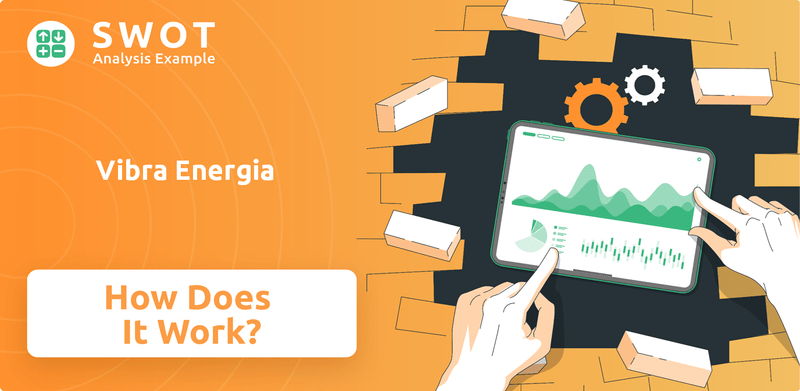
This exploration of Vibra operations will uncover the strategies behind its success. We'll examine how Vibra Energia distributes fuel, its financial performance, and its strategic moves within the competitive Brazilian energy market. Investors and industry watchers alike will gain valuable insights into Vibra Energia SWOT Analysis and its future prospects.
What Are the Key Operations Driving Vibra Energia’s Success?
Vibra Energia creates and delivers value through a multifaceted operational model centered on fuel and lubricant distribution, complemented by a growing portfolio of energy solutions. The company's core offerings include petroleum-derived fuels, biofuels, natural gas for vehicles, and a comprehensive range of lubricants. These products serve both a vast retail network and a large B2B segment.
The company's operational processes are supported by a vast and efficient logistics infrastructure. This infrastructure includes fuel storage bases, lubricant deposits, and airport fuel stations strategically located across Brazil. This extensive network enables efficient sourcing, storage, and distribution of fuels and lubricants nationwide, contributing to its market leadership in terms of volumes sold and its expansive gas station network.
Vibra's commitment to diversifying its energy offerings, including ventures into the free energy market and gas distribution, further enhances its value proposition by adapting to evolving market demands and energy transition trends. The company's robust infrastructure and brand recognition translate into significant customer benefits, including widespread accessibility to fuel and services, and reliable supply for large industrial clients. To learn more about the company's customer base, check out the Target Market of Vibra Energia article.
Vibra Energia's primary products include gasoline, diesel, ethanol, natural gas for vehicles, and Lubrax lubricants. It serves the retail market through its network of BR fuel stations and the B2B segment, providing fuel and lubricants to various industries. The company is also the largest aviation fuel supplier in Brazil.
Vibra operates a vast logistics network, including fuel storage bases, lubricant deposits, and airport fuel stations. This infrastructure supports the efficient sourcing, storage, and distribution of fuels and lubricants across Brazil. The company’s strategic locations ensure wide accessibility.
Vibra Energia serves two primary customer segments: the retail network of BR fuel stations and a B2B segment with over 10,000 customers. It holds a significant market share in aviation fuel supply. This diversified customer base supports Vibra's extensive operations.
Vibra offers widespread accessibility to fuel and services, reliable supply for industrial clients, and a commitment to adapting to market demands. The company's strong brand recognition and robust infrastructure contribute to its value proposition. It is a key player in the Brazilian energy market.
Vibra Energia's operational success is driven by several key factors, including its extensive distribution network and strong brand presence. The company's focus on both retail and B2B segments ensures a diversified revenue stream. The company continues to adapt to the evolving energy landscape.
- 92 fuel storage bases.
- 12 lubricant deposits.
- 92 airport fuel stations.
- 57% market share in aviation fuel supply.
Vibra Energia SWOT Analysis
- Complete SWOT Breakdown
- Fully Customizable
- Editable in Excel & Word
- Professional Formatting
- Investor-Ready Format
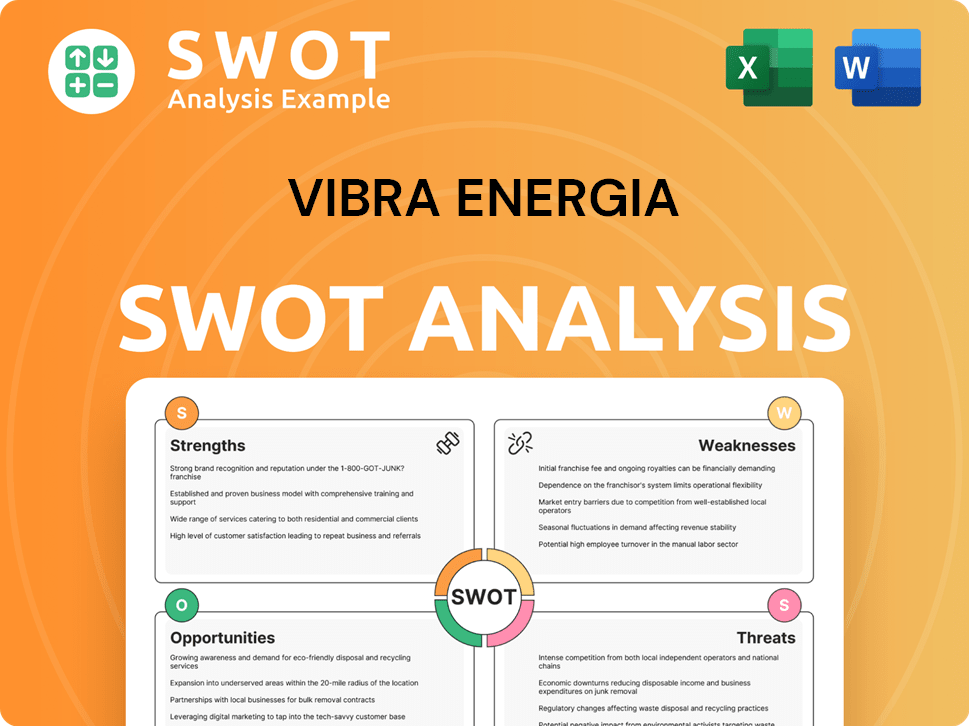
How Does Vibra Energia Make Money?
Understanding the revenue streams and monetization strategies of the Vibra company is crucial for assessing its financial health and market position. Vibra Energia, a key player in the Brazilian energy sector, generates revenue primarily through fuel distribution and related services. This article delves into the specifics of how Vibra operates and generates income.
Vibra Energia's financial performance is driven by its diverse revenue streams, which include both traditional fuel sales and emerging ventures in renewable energy. The company's strategic approach to monetization involves optimizing its existing assets while expanding into new, high-growth areas. Analyzing these strategies provides insight into Vibra's adaptability and future growth potential.
The company's revenue is primarily generated from two main segments: Retail Network and Large Customers. The Retail Network segment, which accounted for 62% of revenue in the 12 months ending March 2024, encompasses sales through fuel stations, convenience stores, and service centers. The Large Customers segment contributed 38% of revenue during the same period, serving industrial and commercial clients. For the full year 2024, Vibra reported annual adjusted net revenue of R$ 173 billion, an increase of 5.7% from 2023. In the first quarter of 2025, net revenues climbed 13% to R$ 45 billion.
Vibra Energia's monetization strategies are multifaceted, focusing on both core fuel sales and diversification into new markets. The company leverages its extensive network of fuel stations and convenience stores to drive revenue. Furthermore, Vibra is actively expanding into renewable energy to capture new market opportunities. To learn more about the company's marketing approach, you can review the Marketing Strategy of Vibra Energia.
- Fuel Sales: Direct sales of petroleum-derived fuels, biofuels, and lubricants constitute a major revenue source.
- Retail Operations: Revenue is generated from approximately 1,310 convenience stores as of March 2024, which are part of the BR Mania network.
- Renewables: Vibra is expanding into the free energy market and gas distribution. In 2024, its renewables segment generated R$ 1.2 billion in net revenue and R$ 268 million in EBITDA in Q1 2025, representing an 8% contribution to total EBITDA. Vibra expects the renewables segment to reach R$ 1.3 billion in EBITDA by 2025, primarily driven by its acquisition of Comerc Energia.
Vibra Energia PESTLE Analysis
- Covers All 6 PESTLE Categories
- No Research Needed – Save Hours of Work
- Built by Experts, Trusted by Consultants
- Instant Download, Ready to Use
- 100% Editable, Fully Customizable
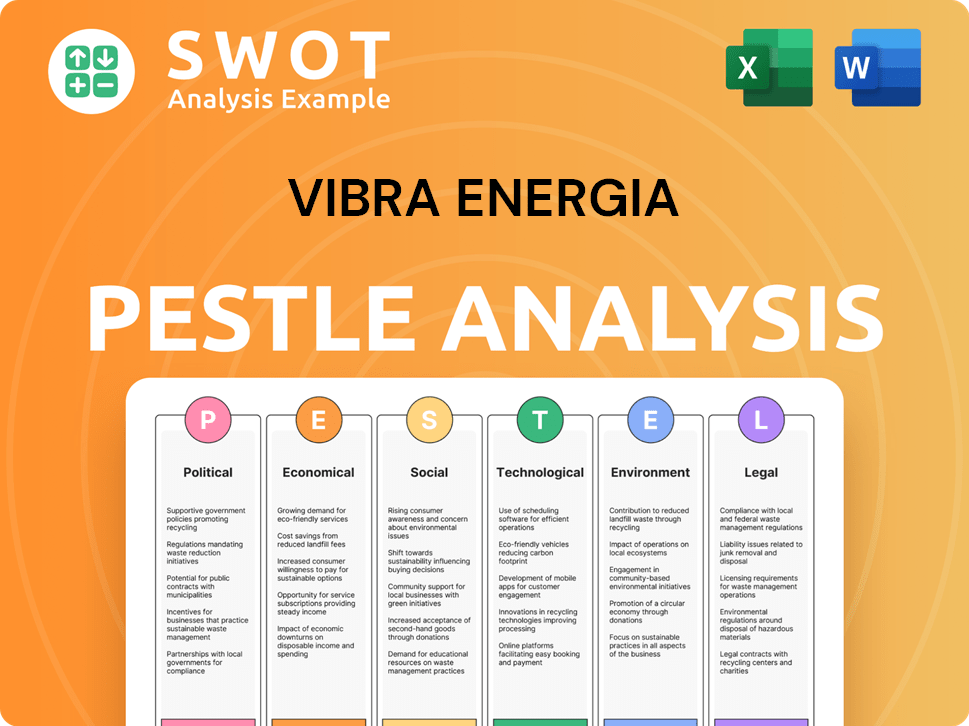
Which Strategic Decisions Have Shaped Vibra Energia’s Business Model?
The evolution of Vibra Energia, a prominent player in the Brazilian energy sector, has been marked by significant milestones and strategic shifts. A key turning point was its privatization in July 2019, which transitioned the company from state ownership to an independent entity, allowing for greater operational flexibility and strategic decision-making.
Since privatization, Vibra has focused on five core pillars: fuel distribution, a vast retail network, B2B solutions, lubricants, and renewable energy initiatives. This strategic focus has positioned Vibra to capitalize on opportunities within the dynamic Brazilian energy market. Vibra's strategic moves have been instrumental in shaping its current operational and financial landscape.
Vibra's operations have been characterized by strategic partnerships and acquisitions aimed at diversifying its business portfolio and strengthening its market position. These initiatives highlight Vibra's commitment to adapting to market trends and expanding its presence in the energy sector.
The privatization of Vibra Energia in July 2019 was a pivotal moment. This transition from a state-owned enterprise to an independent company provided the flexibility needed to pursue strategic growth. The company's focus on fuel distribution, retail, B2B solutions, lubricants, and renewables has been central to its expansion.
Vibra has actively pursued strategic partnerships and acquisitions to diversify its business and strengthen its position in the Brazilian energy market. The acquisition of Comerc Energia Ltda. in August 2024 for BRL 7 billion expanded its presence in the electricity market. Vibra's partnership to supply renewable diesel for Volkswagen trucks and buses is another strategic move.
Vibra's competitive advantages include its market leadership as the largest fuel distributor in Brazil and an extensive logistics network. The company's vast network of gas stations and distribution assets provides significant economies of scale. Vibra's continuous adaptation to new trends, such as the energy transition, and its focus on renewable energy sources, further solidify its competitive edge.
In August 2024, Vibra acquired the remaining 50% stake in Comerc Energia Ltda. for BRL 7 billion, adding 2.1 GW of renewable energy capacity. The company also partnered to supply Vibra Renewable Diesel for Volkswagen trucks and buses. Vibra announced its exit from ZEG Biogás e Energia's capital structure in March 2025, reallocating approximately R$ 400 million in future project investments.
Vibra Energia's strategic initiatives are focused on expanding its presence in the energy sector and diversifying its business model. These moves are aimed at strengthening its market position and capitalizing on emerging opportunities. For more insights into Vibra's growth strategy, explore the Growth Strategy of Vibra Energia.
- Acquisition of Comerc Energia Ltda. to expand into the electricity market and renewable energy.
- Partnerships to supply renewable diesel and sustainable aviation fuel (SAF).
- Focus on renewable energy sources and sustainable fuels to maintain a competitive edge.
- Exit from ZEG Biogás e Energia's capital structure to reallocate investments.
Vibra Energia Business Model Canvas
- Complete 9-Block Business Model Canvas
- Effortlessly Communicate Your Business Strategy
- Investor-Ready BMC Format
- 100% Editable and Customizable
- Clear and Structured Layout
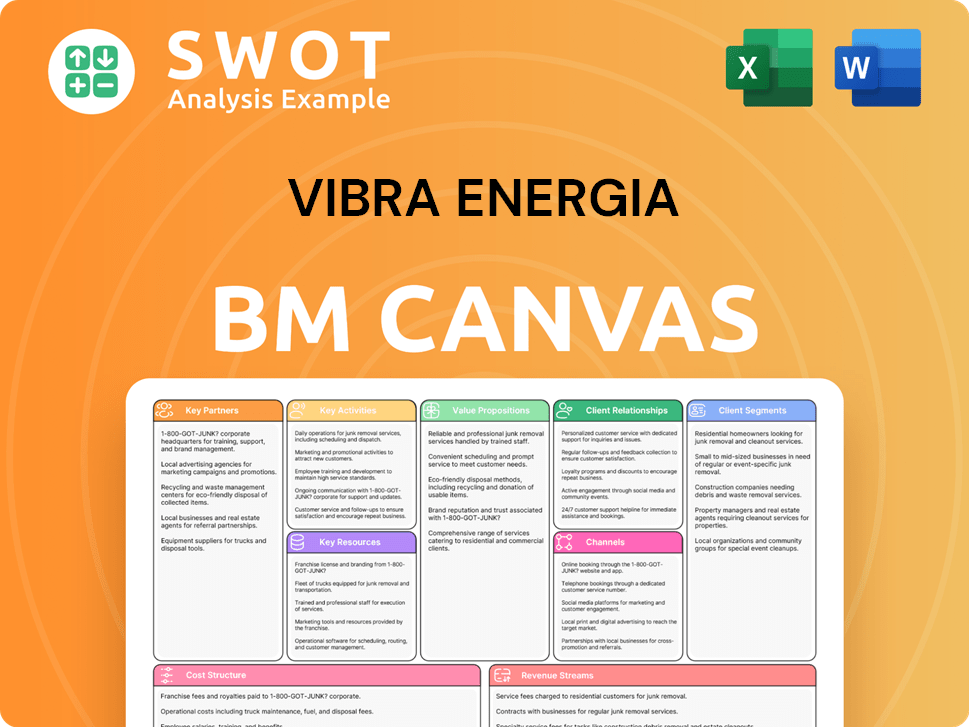
How Is Vibra Energia Positioning Itself for Continued Success?
In the dynamic energy sector of Brazil, Vibra Energia holds a prominent position. As a leading player in the fuel distribution market, the company's operations and strategic initiatives are critical to understanding its current standing and future prospects. Analyzing Vibra's market position, associated risks, and future outlook provides valuable insights into its potential for investors and stakeholders.
Vibra Energia has established itself as a key player in the Brazilian energy market. With a focus on fuel distribution and a growing presence in renewable energy, the company navigates the complexities of the industry. This analysis explores Vibra's role, its challenges, and its strategic direction.
Vibra Energia is the largest fuel distributor in Brazil, with a market share of approximately 24.6% in fuel sales as of 2023. The company's extensive network and infrastructure provide a strong competitive advantage. This allows it to maintain customer loyalty.
Vibra company faces risks, including revenue concentration in fuel distribution. Volatile fuel prices and regulatory changes also pose challenges. Diversification into new markets, such as renewable energy, requires significant investment and time to develop.
Vibra Energia aims to be a comprehensive energy solutions provider, expanding beyond fuel distribution. Strategic initiatives include investment in its core fuel business and development in ethanol trading and electric energy. Capital spending is expected to be around BRL 1.5 billion in 2024.
The acquisition of Comerc Energia is a significant step in expanding its renewable energy portfolio. The company plans to increase its electricity consumption from renewable sources from approximately 35% to 50% in the next three years. Vibra's long-term vision includes neutralizing emissions, aligning with global decarbonization efforts.
Vibra Energia's strategic initiatives focus on diversification and sustainability to ensure long-term profitability. The company is committed to expanding its renewable energy portfolio and reducing its environmental impact. These efforts are designed to adapt to the evolving energy landscape and meet future demands.
- Investment in core fuel distribution, particularly in agribusiness-related regions.
- Development in ethanol trading and electric energy.
- Acquisition of Comerc Energia to expand its renewable energy portfolio.
- Increase electricity consumption from renewable sources.
Vibra Energia Porter's Five Forces Analysis
- Covers All 5 Competitive Forces in Detail
- Structured for Consultants, Students, and Founders
- 100% Editable in Microsoft Word & Excel
- Instant Digital Download – Use Immediately
- Compatible with Mac & PC – Fully Unlocked
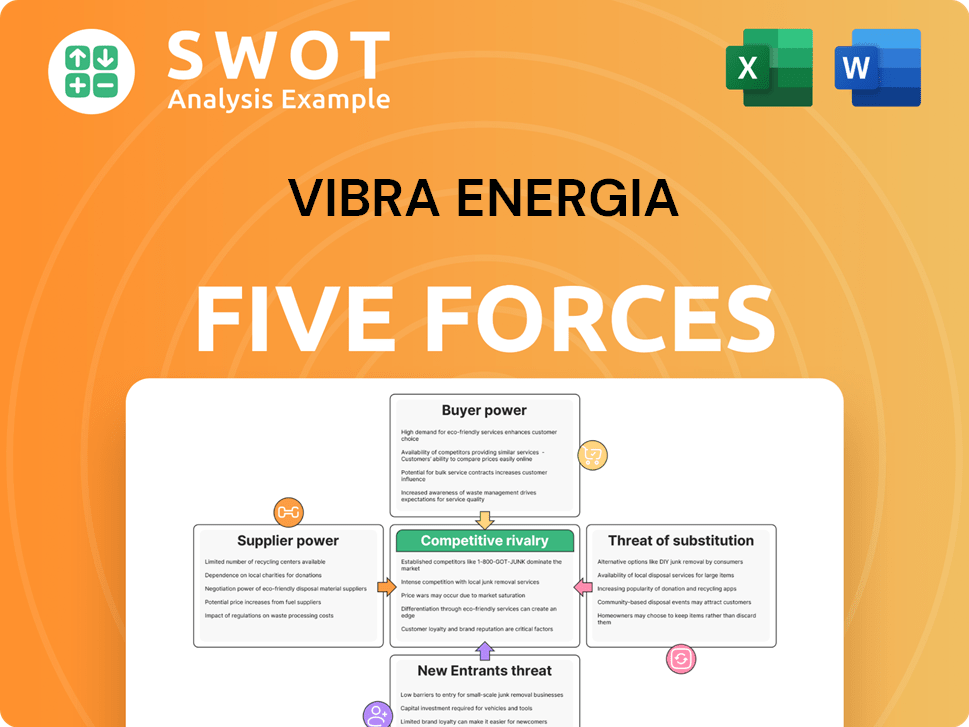
Related Blogs
- What are Mission Vision & Core Values of Vibra Energia Company?
- What is Competitive Landscape of Vibra Energia Company?
- What is Growth Strategy and Future Prospects of Vibra Energia Company?
- What is Sales and Marketing Strategy of Vibra Energia Company?
- What is Brief History of Vibra Energia Company?
- Who Owns Vibra Energia Company?
- What is Customer Demographics and Target Market of Vibra Energia Company?
Disclaimer
All information, articles, and product details provided on this website are for general informational and educational purposes only. We do not claim any ownership over, nor do we intend to infringe upon, any trademarks, copyrights, logos, brand names, or other intellectual property mentioned or depicted on this site. Such intellectual property remains the property of its respective owners, and any references here are made solely for identification or informational purposes, without implying any affiliation, endorsement, or partnership.
We make no representations or warranties, express or implied, regarding the accuracy, completeness, or suitability of any content or products presented. Nothing on this website should be construed as legal, tax, investment, financial, medical, or other professional advice. In addition, no part of this site—including articles or product references—constitutes a solicitation, recommendation, endorsement, advertisement, or offer to buy or sell any securities, franchises, or other financial instruments, particularly in jurisdictions where such activity would be unlawful.
All content is of a general nature and may not address the specific circumstances of any individual or entity. It is not a substitute for professional advice or services. Any actions you take based on the information provided here are strictly at your own risk. You accept full responsibility for any decisions or outcomes arising from your use of this website and agree to release us from any liability in connection with your use of, or reliance upon, the content or products found herein.